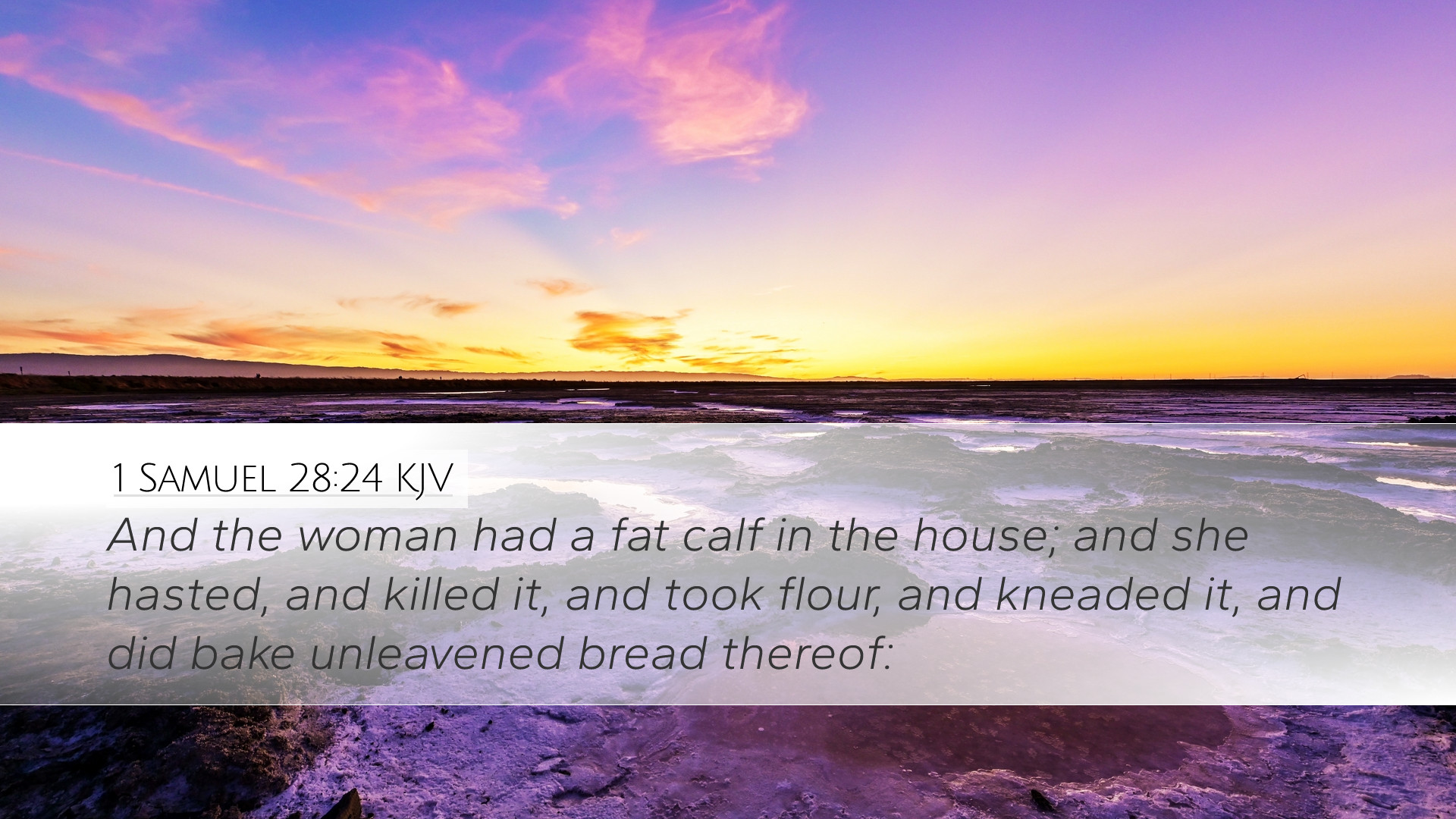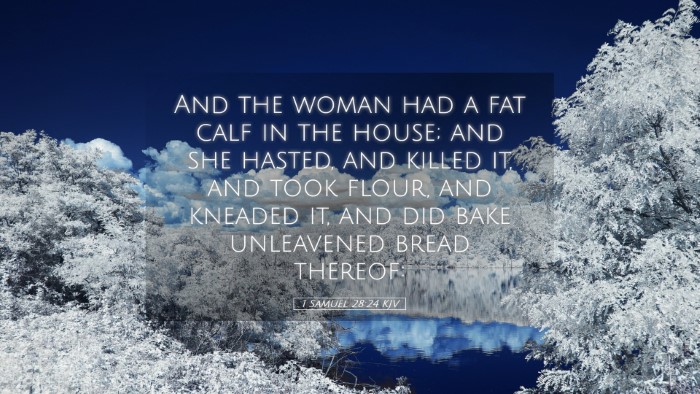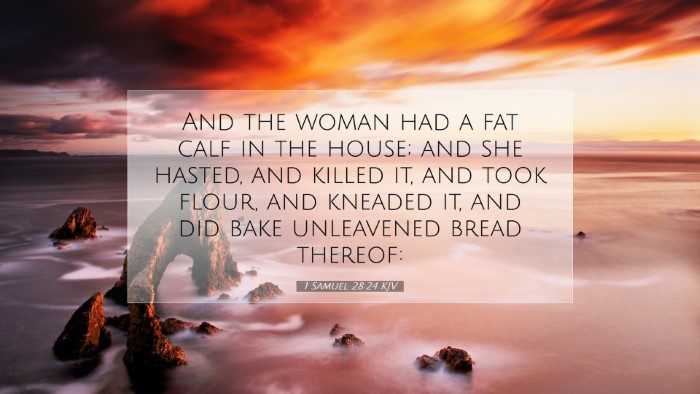Commentary on 1 Samuel 28:24
Verse Text: "And the woman had a fat calf in the house; and she hasted, and killed it, and took flour, and kneaded it, and did bake unleavened bread thereof." (1 Samuel 28:24)
Introduction
This verse presents a critical moment in the narrative of 1 Samuel 28, where Saul, under desperate circumstances, seeks guidance from the sorceress of Endor. This passage is significant not only for its historical context but also for its theological implications. By examining this verse through the insights of renowned public domain commentators such as Matthew Henry, Albert Barnes, and Adam Clarke, we aim to uncover deeper meanings and practical applications for today’s readers.
Contextual Overview
In the preceding chapters, we observe Saul’s decline as the anointed king of Israel, culminating in his fateful decision to consult a medium. This chapter highlights the spiritual and moral degradation that occurs when individuals attempt to bypass divine guidance. The choice of the witch of Endor as a counselor illustrates the desperate state of Saul, who, having been rejected by God, finds himself seeking answers in forbidden practices.
Matthew Henry's Analysis
According to Matthew Henry, the actions of the woman at Endor reveal a deep understanding of hospitality and tradition. Henry notes that the woman acted promptly and with care, emphasizing that she had a fat calf, indicating the value of her offering in a time of need. He articulates the significance of the meal, linking it to the customs of welcoming important guests, suggesting that she recognized Saul's state and the gravity of the situation.
- Hospitality and Sacrifice: Henry suggests that the woman’s actions are emblematic of exceeding normal hospitality, showing that she spared no effort in preparing a meal for Saul, despite the risks involved.
- Symbolism of Unleavened Bread: The unleavened bread serves as a symbol of urgency and purity. Henry posits that this serves to highlight the spiritual seriousness of Saul’s visit and his need for favor from God amidst his dire predicament.
Albert Barnes' Insights
Albert Barnes provides a succinct examination of the woman’s quick preparations. He notes that the calf represents a significant act of offering, indicative of both her survival instincts and her acknowledgment of Saul’s royal status.
- Preparation and Readiness: Barnes points out the woman’s readiness to provide for Saul, even when risking exposure of her practices, highlighting her understanding of the importance of this encounter.
- Theological Reflections: Barnes warns readers about the precarious spiritual state Saul finds himself in, pointing to the broader implications of turning to mediums and seeking counsel outside of God’s ordained means.
Adam Clarke's Commentary
Adam Clarke delves into the specifics of the food preparation, linking it to the practices of ancient Near Eastern cultures. Clarke emphasizes the cultural norms surrounding food and hospitality, suggesting that the fat calf and the unleavened bread illustrate the seriousness with which the woman regarded her guest.
- Cultural Context: Clarke elucidates that in the ancient context, such an offering would denote respect and an acknowledgment of Saul's troubled situation, mirroring the customs of the time.
- Spiritual Implications: Clarke reflects on the irony of Saul seeking help from a sorceress while simultaneously being served a meal that reflects the old covenant practices. It serves to remind the reader of the dichotomy between Saul’s actions and God's intended order.
Theological Reflections
This passage prompts readers to engage with broad theological themes:
- Disobedience to God: Saul's visit to the medium embodies a critical deviation from God's commandments, urging an introspection into our reliance on external sources rather than divine wisdom.
- God’s Sovereignty: Even amidst Saul's disobedience and desperation, God’s plan continues to unfold. The subsequent events leading to Saul’s demise illustrate that God's purposes remain unthwarted, regardless of human actions.
- Human Vulnerability: The narrative highlights the human tendency to seek solace in forbidden places during times of distress. The woman’s willingness to aid Saul reflects the desperation of those estranged from God’s favor.
Practical Applications
For pastors, students, theologians, and Bible scholars, this verse serves as a potent reminder of:
- Faithfulness in Leadership: Leaders are urged to maintain faithfulness to God’s guidance, recognizing the profound consequences of straying from divine instruction.
- The Dangers of Seeking Unholy Guidance: The episode warns against seeking answers outside of faithful spiritual mentorship and reliance on God’s word, encouraging believers to trust in God’s providence.
- Hospitality as Ministry: The woman's actions invite readers to consider how we can serve others in times of need, demonstrating hospitality as a form of ministry rooted in love and respect.
Conclusion
1 Samuel 28:24 encapsulates a significant moment in biblical history, revealing deep layers of human experience, divine sovereignty, and the consequences of our choices. By reflecting on the insights of Matthew Henry, Albert Barnes, and Adam Clarke, contemporary readers gain valuable understanding and applicability from this poignant narrative. As believers navigate their spiritual journeys, this passage challenges them to seek divine guidance while embodying principles of hospitality and grace in their interactions with others.


